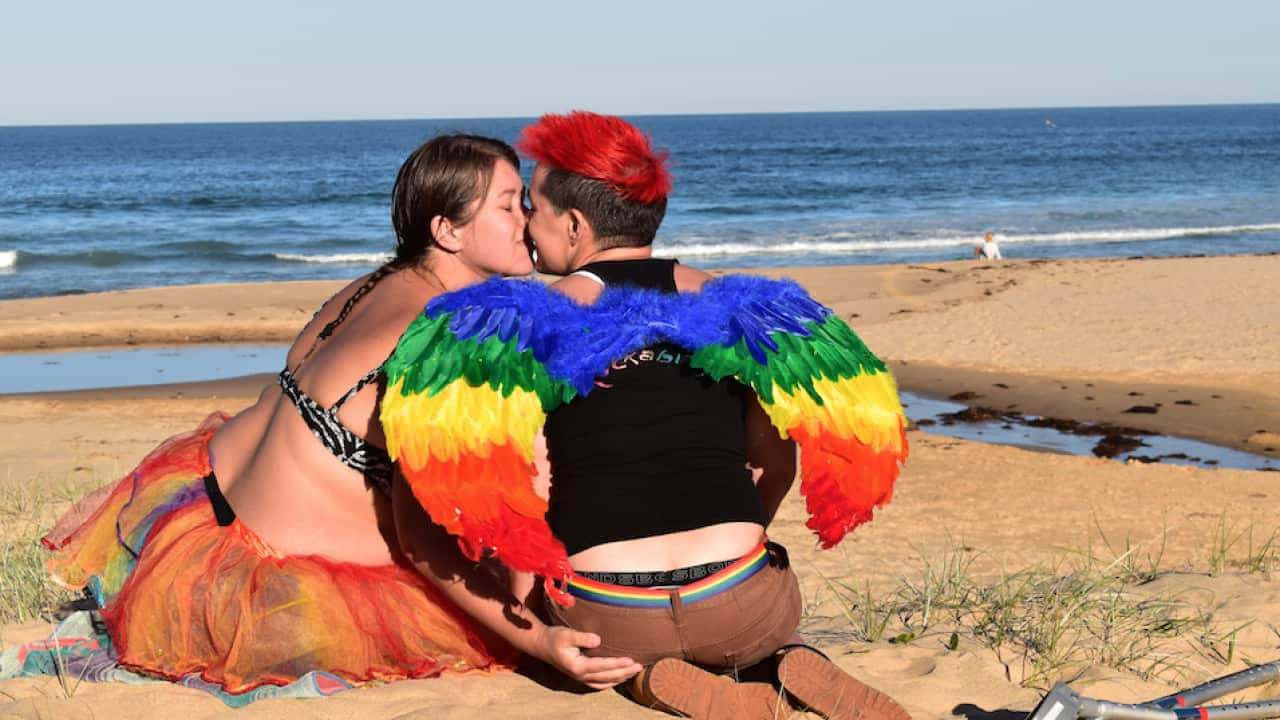With her shock of brilliant, post-box-red hair, close-cropped sides and her leather jacket, disability and queer rights activist and spoken-word performer , “flags lesbian pretty hard,” in her own words.
It’s frustrating, then, that when she’s out and about with her girlfriend Anne, including in a gay bar, so many strangers assume they are sisters or perhaps friends. While that’s not an uncommon queer experience, Brown says it also has a lot to do with her wheelchair.
“Even when we’re holding hands or calling each other ‘love’ in public spaces, people will often presume of course we can’t be in a sexual relationship,” Brown says. “That’s something that’s really important to both of us, how do we be out and proud and how do we make that visible in a respectful way, because people just aren’t used to seeing queer people with disabilities in the world, living our lives.”
An outspoken member of Quippings: Disability Unleashed, a “collective of performers with bodies and minds of unending variation showcasing emerging and established performers with disabilities,” Brown will join the troupe for at Melbourne’s Malthouse Theatre during this year’s .
Combing intimate spoken-word pieces with comedy and dance, the line-up also includes the likes of “amputee superstar” Kath Duncan, emcee Julie McNamara, writer Carly Findlay and emerging stand-up stars Jarrod Marrinon, Katy Beaton and Maddy Seiter, presenting an evening of radical love that knows no ability boundaries.
“My spoken word stuff is cheekily comedic and raunchy, which is a really interesting method of talking about disability rights more broadly and about the intersection with sexuality,” Brown says. “I get to have a different interaction with a wider audience than I do in my public speaking, which is a bit more earnest.”
Often the only time sexuality and disability are discussed hand-in-hand in the media is when disabled heterosexual men’s rights to explore their sexuality with paid sex workers arises, Brown says. “It’s not queer sexuality, or even women’s sexuality.”
There are some positive signs that discussion surrounding the NDIS is shifting the landscape, Brown argues, but changing pervasive ideas about who is desirable can be a hard slog in the LGBTIQ community. “Often queer parties are up a flight of stairs in a dark room because that’s where we’ve had to be to hide away from homophobia and transphobia historically, but it means that they are really inaccessible to many people with disabilities,” Brown notes.
Those physical barriers lead to less visibility and the cycle continues. “We’re not actually out at those parties and therefore people often hold these unconscious prejudices, so when people do see me out, they’re kind of shocked that I would have a girlfriend and be in a queer space. It takes them by surprise.”
Quippings is all about raising visibility and changing the dialogue around disability and sexuality, with the Emerging Writers Festival and the Malthouse a great platform in which to be seen and heard. “Love is a universal thing,” Brown says. “It’s particularly something we’re fighting for with equal marriage but also in the disability rights community, the idea that we can be loved for all that we are, and that includes our disabilities. They are often a central part of our identities and a positive part of how we view ourselves.”
The breadth of talent on show in Quippings is a big part of that. “All our pieces are coming at it from a very different perspective because we’re all very different individuals and performers, so it makes for a very interesting and dynamic show.”
Conveying that diversity is so important to Brown, particularly given the stark figures faced by disabled Australians. “We know that 45 per cent of people with disabilities live on or below the poverty line and only half of us have paid employment, and so a way to create equality is for us to be actually able to get job and have those opportunities.”
That includes casting more disabled performers in disabled roles, with a recent finding that, despite disabled people making up roughly 18 per cent of the population, only four per cent of characters in TV dramas aired between 2011 and 2015 where identified as disabled.
There need to be more disabled people behind the camera too. “All too often, people have written about us and they’ve presumed that of course we must live these sad, terrible, lonely lives where our disabilities are tragedy or conversely that we must be inspirations just for getting up in the morning and going about our day,” Brown says. “We need to move beyond that and show that people with disabilities are complex, interesting human beings, that we live a full breadth of the human experience and we need to start seeing that 18 per cent, because that will change attitudes.”
The runs from June 14-23. Catch Quippings presents: LOVE SHOW at Melbourne’s Malthouse Theatre on .


